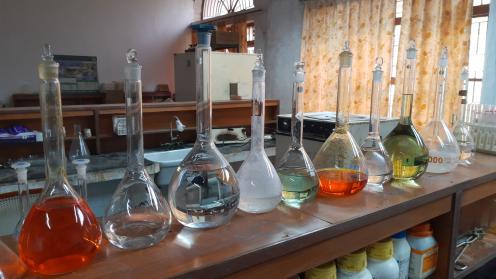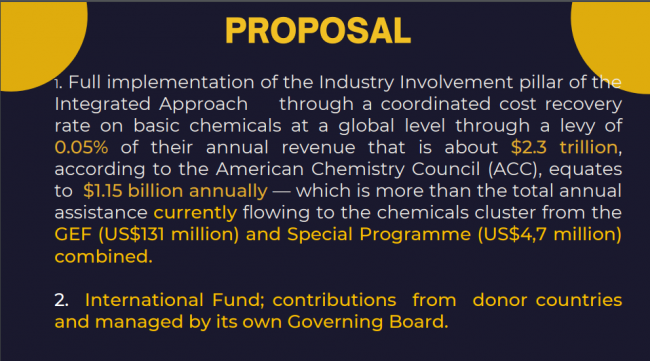Delegates to the fourth session of the Intersessional Process for Considering the Strategic Approach to International Chemicals Management (SAICM) and the Sound Management of Chemicals and Waste Beyond 2020 (IP4) met on Sunday, 28 August 2022, for a technical briefing on financial considerations for a post-2020 instrument.
Financial Resources for the Sound Management of Chemicals and Waste under the Strategic Approach and the “Beyond 2020” Framework
Jonah Ormond, Antigua and Barbuda, moderated the briefing.
Fifth International Conference on Chemicals Management (ICCM5) President Anita Beyer stressed all stakeholders have a role to play in achieving the goal of finding adequate funding for global cooperation on managing chemicals and waste. She underscored the importance of producing clear, concrete, and easy-to-understanding messages for ICCM5 to get the necessary political and financial support. “Leaders need to understand the priority and urgency of our work,” she said, so they will invest more to protect our children, families, workers, and the environment.
Anil Sookdeo, Global Environment Facility (GEF), noted that the GEF-8 replenishment was 30% larger than GEF-7, and chemicals and waste are now allocated 15% of the total. He outlined the major objectives of the GEF-8 chemicals and waste strategy as:
- policy coherence to support and create the necessary enabling conditions to transition to cleaner chemistry and eliminate existing waste;
- preventing a future build up of harmful chemicals and waste in the environment, particularly in supply chains that are major users and emitters of persistent organic pollutants (POPs) and mercury; and
- eliminating harmful chemicals and waste in current waste streams and those stockpiled in existing infrastructure and processes.
Olivier Baldan, SAICM Secretariat, outlined the conclusions and recommendations of the UN Environment Programme’s (UNEP) “Study on Industry Involvement in the Integrated Approach to Financing the Sound Management of Chemicals and Waste.” He said the study’s possible actions for the post-2020 regime include:
- defining the industry involvement component;
- developing a mechanism to track progress;
- establishing a capacity-building clearinghouse mechanism;
- developing and promoting the use of a comprehensive and harmonized set of recommendations for chemicals-related sustainability disclosures; and
- creating a technical expert group to expedite the mobilization of funds needed by developing countries.
Consultant Jozef Buys presented an overview of his study on possible funding sources. He suggested IP4 may wish to recommend to ICCM5 creating a publicly available inventory of funding sources based on his study and designating an authority to curate the inventory.
In an interactive panel, Olubunmi Olusaya, Nigeria, for the African Group, presented the Group’s proposal for a contribution of 0.05% of industry’s global annual revenue toward funding implementation of a post-2020 instrument, which, based on the American Chemistry Council’s estimate of USD 2.3 trillion in annual revenue, would result in USD 1.15 billion annually in funding for the chemicals and waste agenda. He further explained that the Group supports the proposal for a standalone international fund, with its own Governing Board, to manage the funds.
David Azoulay, Center for International Environment Law (CIEL), presented the CIEL-International Pollutant Elimination Network (IPEN) proposal for an international coordinated fee on the annual sales value of 35 basic chemicals that are used in producing most other chemicals, which he projected would generate about USD 11.5 billion annually. He outlined the 35 chemicals and noted that if just 10 key countries representing 77% of global production of these chemicals adopted the measure—Brazil, China, France, Germany, India, Japan, Russia, South Korea, the UK, and the US—it would generate nearly USD 9 billion annually.
Servet Gören, European Chemicals Council, on behalf of the International Council of Chemical Associations (ICCA), stressed the chemical industry’s existing commitment to SAICM. She outlined industry thoughts on an IP4 recommendation for a capacity-building platform or clearinghouse or marketplace, including:
- creating a visible online hub matching capacity-building needs with available resources that is open to all stakeholders;
- making participation voluntary, but requiring all participants to report on their capacity-building projects; and
- incorporating progress by tracking and requiring reporting to the post-2020 platform.
Johannes Heister, World Bank, discussed the Bank’s proposal for a new Trust Fund, ProClean, consisting of four pillars:
- environmental health and prevention of non-communicable diseases;
- air quality management and climate change mitigation;
- integrated management of chemicals and waste; and
- circular economy for a clean, inclusive and healthy economic recovery.
He explained the chemicals and waste pillar would scale up lending and technical assistance, strengthen the economic case to tackle chemicals and waste management, leverage inventions supported by other Bank funds and by development partners, and seek synergies with other global initiatives.
In the ensuing general discussion, many African delegates urged support for their tax proposal. Some delegates also indicated interest in the CIEL/IPEN proposal. ICCA cautioned that simply creating a pot of new funds was not the answer unless funds will be channeled to priority concerns and serve to close the gap in chemicals and waste management between developed and developing countries. Iran urged that any new funding flows be monitored and audited. The International Trade Union Confederation pointed out that industry already pays a tax on a limited number of chemicals for the US Superfund program that provides more funding than the African proposal would generate.
In conclusion, Reggie Hernaus, the Netherlands, noted the increased funding for chemicals and waste in GEF-8, and that SAICM is embedded in the new GEF program. He said the study on industry involvement adds value to IP4’s deliberations on financing. He urged all parties to bring concrete text proposals to the IP4 discussions.


